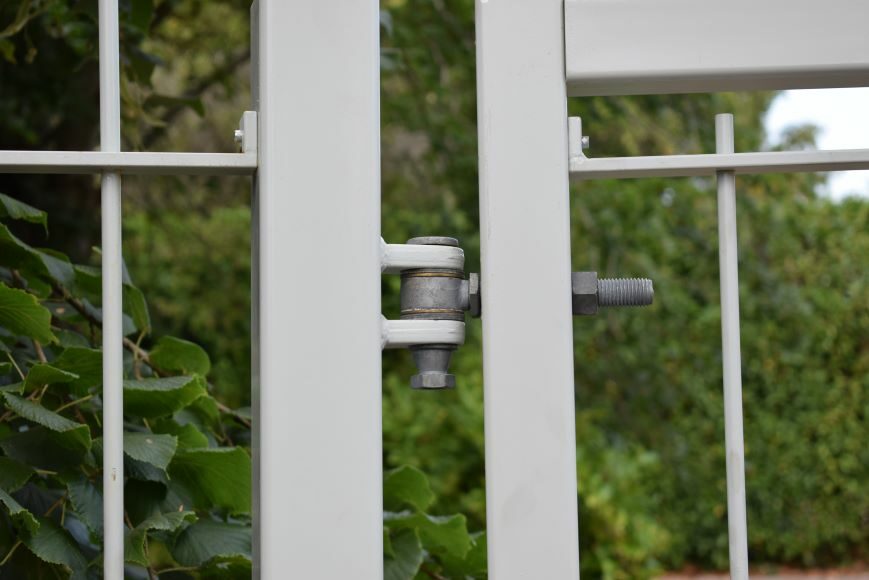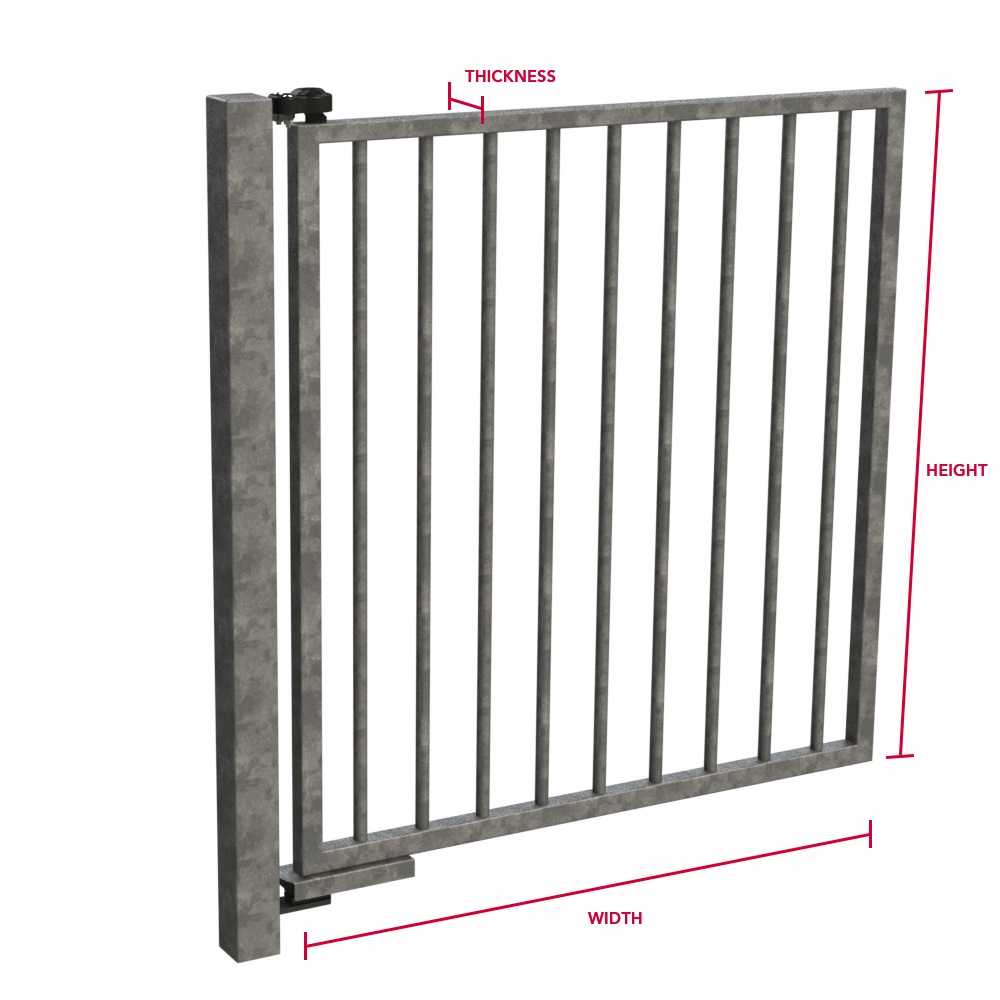Just like with locks, there are a few factors to consider when you’re trying to find the right hinge for your new gate. You don’t need to be a hinge expert, but knowing things like material, size and usage of your gate goes a long way.
So, before you go to the local DIY store, read the below for a good start to find the right hinges for the job.
Material
There are two areas to consider when it comes to the material:
- The gate itself
- The gate post
Similar to the process of finding the right gate lock, the material will determine how the hinge is secured to the gate and the gate post. If your gate is made from steel or another metal, you might be able to use weldable hinges, for example the Gatemaster Superhinge or a captive nut hinge as shown below, or you can use screw-fixed hinges. With wooden gates, you can only use screw-fixed hinges.
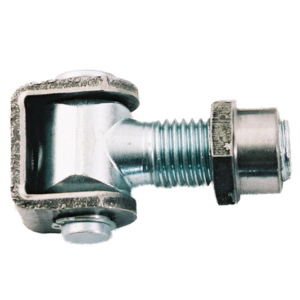
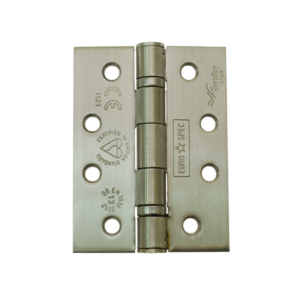
The same naturally goes for the gate post. Depending on the material of the gate post, you will need different fixings for metal, wooden and masonry. If you want more information of the different types of fixings for gate post materials, you can read more about it here.
Weight
When it comes to hinges, weight is a crucial consideration for ensuring maximum functionality and gate safety.
Unfortunately, sometimes the hinges aren’t fit to handle the weight of a gate and can cause the hinges to fail. This can be because of impact, long-term wear, or the sheer weight of the gate.
To help avoid hinge failure, knowing the full weight of of your gate will help determine the size, number, and type of hinges you need. In any case, it is a good idea to follow safety guidelines. Installing a gate tether or other safety products can help minimise risk and potential damage should the hinges fail.
Lighter gates:
For a small metal garden gate, you won’t necessarily need to go top spec for your hinge as a smaller hinge is more suitable. Hinges such as flag hinges, universal hinges, or continuous hinges will do the job just fine.
Heavy gates:
There are several heavy-duty hinges on the market which are specifically designed to take higher weights. If you have a heavy gate and you want to ensure the hinge is suitable, we recommend you check:
- If it has grease points to facilitate smooth hinge operation
- The hinge material to ensure it is durable and strong (for example brass is a good bearing material that helps prevent wear)
- The maximum weight it can take (be aware that sometimes these limits are stated in pairs)
- The maintenance recommendations so you can take care of them properly
Size
The next thing to consider is the size of the gate. By this, we mean the width, height and thickness of the gate as shown in the diagram below.
Out of these measurements, width will have a significant part in determining the strength needed of the hinges you need. The gate width impacts the hinges as the wider the gate, the more pressure on the top hinge.
Some hinges will have a stated limit of the width of the gates they are suitable for. If possible, we recommend you check this with the supplier before you commit to a hinge size or type.
If your gate opening is especially wide, gate hinges might not be the best solution. We recommend, where possible, to make it a sliding gate by using a gate track system. This is generally safer than using hinges as the gate is supported along its length when used. While we don’t supply track systems, there are plenty of options available on the market such as Rolling Center or F. H. Brundle.
It is also worth checking if the width of the hinge fixings matches the thickness of the gate leaf. E.g., a weld-in gate hinge shouldn’t be thicker than the frame it is being welded onto.
Usage and location
Consider where the gate will be located as this will affect how and how often the gate is used.
Let’s take an example. A large industrial estate with a special entrance for their deliveries might need to open their gate often or keep it open to enable seamless deliveries. If it is opened frequently, this needs to be considered as the hinges will experience a lot of wear and tear. Low friction and heavy-duty hinges such as the Superhinge or sealed bearings hinge will therefore be the way to go for this type of usage.
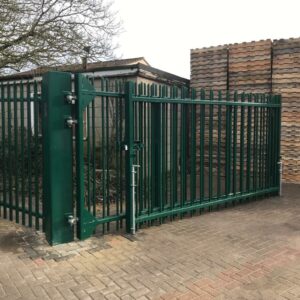
Staying with our industrial gate, entrances used by lorries need to pass through are common to have gates that open more than 90 degrees. This is to provide more space for the vehicles to turn. Not all hinges open this wide, so if it is a requirement, check this before purchasing.
It is less important that a hinge for your garden gate or small side gate is heavy-duty or can open more than 90 degrees. What is important is that they are reliable and won’t seize after only a few months. Using stainless steel hinges like this one or a polymer alternative like these examples from Toolstation is therefore our recommendation (especially if you live in a humid climate!).
You might be installing a gate in an area where children will be using the gate frequently. Risks such as pinch points, crushing points, and trip hazards are all risks to familiarise yourself. There are some specific recommendations to ensure the gates are as safe as possible. We cover this in the next point.
Who will use the gate?
This brings us to the final consideration when you have to find the right hinge: who is using the gate? If the gate is located in public areas used frequently by children – like parks and playgrounds – there are additional factors to acknowledge.
One of these is pinch points. When opening and closing the gate, children are at the risk of getting their fingers pinched or even crushed. The Royal Society for Prevention of Accidents (RoSPA) therefore recommends using hinges that ensure a non-reducing gap throughout the opening and closing of the gate.
Hinges sitting in the gate’s pivot point, such as this stop hinge set, are a good solution as they maintain the same gap size when the gate is used. Some hinges also have built in gate closing mechanisms which are suitable for use on pedestrian gates like the APS hydraulic gate closer. Read about how this gate closer was used on an entrance gate at a local school in our case study.
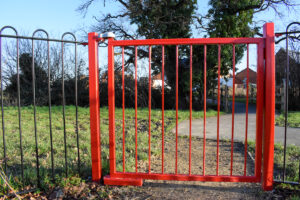
For more information on how to make gates and fencing safer on public areas, check out RoSPA’s website.
Budget
Budget always comes into play, so consider your hinge requirements and don’t buy one that does more than needed. If you only require a hinge for your garden gate, there is no point buying a hinge that opens 180-degrees. But it is worth looking into stainless steel options, which are more expensive, but last longer in return.
Get our advice
If you are looking for advice on which hinges to get, you will now be prepared for any questions we might throw at you.
Because the more information you give us, the better service we can provide. Help us help you find the right hinge for your gate by getting in touch today.



